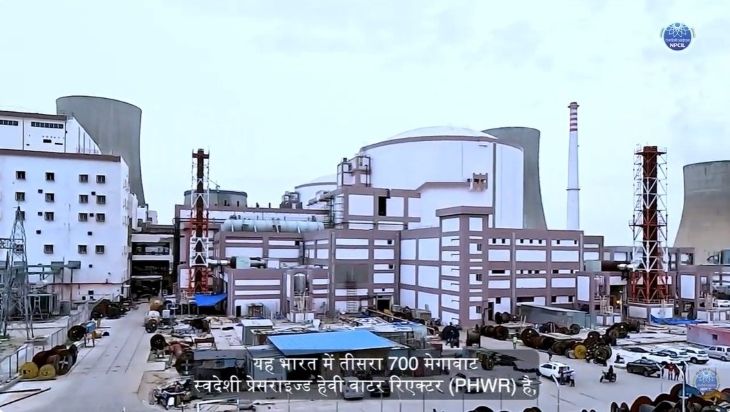 The site is home to two 700 MWe PHWRs (Image: screengrab from NPCIL video)
The site is home to two 700 MWe PHWRs (Image: screengrab from NPCIL video)Unit 7 at the Rajasthan Atomic Power Project is the third 700 MWe indigenous pressurised heavy water reactor to be connected to the Indian grid.
The unit - which is also known as RAPP-7 - reached first criticality in September and was connected to the northern grid early on Monday.
"With the clearance from the Atomic Energy Regulatory Board AERB and passing all tests with flying colours, unit 7 is now synchronised with the National Grid," Nuclear Power Corporation of India Ltd (NPCIL) said in a video released to mark the achievement.
Once a new unit has been connected to the grid, it undergoes a process known as power ascension testing when its power levels are gradually raised - under approval from the regulator - until it reaches full capacity. It will then enter commercial operation.
RAPP-7 follows Kakrapar 3 and 4 in a planned fleet of 700 MWe pressurised heavy water reactors (PHWRs): unit 3 achieved first criticality in July 2020, was connected to the grid in January 2021 and was declared to be in commercial operation in July 2023. Unit 4, which reached first criticality in December 2023, was connected to the grid in February and entered commercial operation in March 2024.
"NPCIL has mastered the art of building and operating these reactors," the company said.
A second 700 MWe unit, RAPP-8, is also under construction at the site at Rawatbhata, which is already home to six operating PHWRs with a total capacity of 1180 MW. NPCIL said it expects RAPP-8 to be operational "in 2025-26".
The government has sanctioned the "fleet mode" construction of further 700 MWe units at Kaiga in Karnataka; Gorakhpur in Haryana; Chutka in Madhya Pradesh; and Mahi Banswara in Rajasthan.Earlier this year, Minister of Finance Nirmala Sitharaman outlined ambitions for the development of at least 100 GW of nuclear energy by 2047 to support India's energy transition efforts. This new capacity would include the development of Indian-designed small modular reactors to be operational by 2033, with amendments to Indian legislation to encourage private sector participation in nuclear projects.India welcomes newest Rajasthan unit to the grid
